Page Content
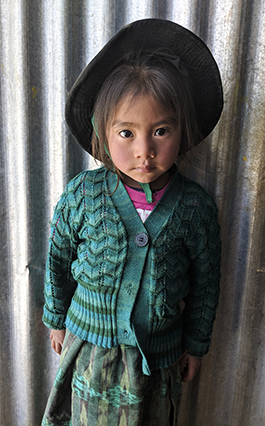
Helping teachers change the world
The Alberta Teachers’ Association’s International Cooperation Program supports the organization’s belief that Alberta teachers can effect change around the world. Through close working relationships with external organizations, the Association enables members to experience rich professional development opportunities in unique educational environments like Uganda and Guatemala.
To apply or get more details on these projects, visit teachers.ab.ca>My ATA>Programs and Services>International Cooperation.
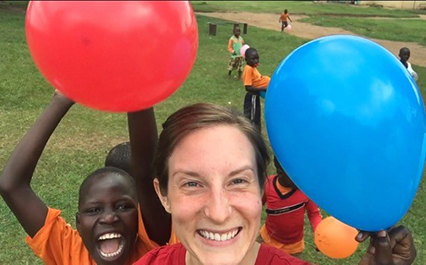
Taryn Deeble gives out balloons at Masulita Children’s Village, the orphanage where she stayed as part of a contingent of Alberta teachers.
Masulita, Uganda Professional Development Project
Africa visit brings surprising result
Taryn Deeble
This summer I was fortunate enough to participate in the Masulita, Uganda project through the Alberta Teachers’ Association. Since arriving home the end of July, family and friends have constantly been asking the question, “So, how was Africa?” It’s difficult to put into words how much this experience has meant.
Do I tell them about the orphanage in Masulita where we lived for two weeks, sharing our free time with children who have come from the streets, impoverished and malnourished? Do I tell them about the schools where we worked with dedicated teachers who barely have the basic resources to teach with, such as pencils and paper for their students, or chalk for a pockmarked chalkboard, let alone any time to themselves when they live and work at the school, usually away from their families? Do I tell them about the students who greatly desire the education they are receiving, and work incredibly hard to master their skills because their families are paying a significant fee for them to attend their “publicly funded” school?
Do I tell them how easy it was to forge a friendship with the people I was privileged to work with, because of their generosity and eagerness to share a part of themselves with me? Do I tell them how happy a people with so little can be? Or, do I tell them how I hope to be just a little bit better, as an educator, as a friend and as a human being?
I think the thing I found most surprising about this experience is that I got so much out of it, when I thought my purpose was to give. ❚
Taryn Deeble spent last year as a literacy support teacher at Tevie Miller Heritage School in Edmonton. She’s now a substitute teacher in B.C.
A life-changing opportunity
Craig Fullarton
Henry van Dyke once said, “Use what talents you possess; the woods would be very silent if no birds sang there except those that sang best.”
After being selected to participate in this year’s Masulita development project, this quote has never had so much meaning. Travelling to Masulita, Uganda is a lesson in humility. The community and the people there have experienced hardships we cannot fathom. Despite this, they smile, welcome visitors with open arms, and share the little they have to show the gratitude they have for the help being provided.
It is a lesson in resourcefulness. This is teaching stripped back to its purest form, with no technology, supplies or even an enclosed classroom. Teachers definitely do have to use the talents they possess to provide welcoming learning environments, engaging lessons and even the supplies needed.
It provides reason for hope. Teachers in Masulita and the surrounding district are willing to go the extra mile (quite literally) to build their own knowledge and to help their students. They are so appreciative of the help and support provided by the Alberta Teachers’ Association. To see more than 150 educators attend a weekend symposium funded by the ATA, travelling large distances on the back of a boda (bicycle or motorcycle taxi) to be there, gives hope that the future of Ugandan children is in good hands.
Yet they still need support. They still need to know that people outside of their beautiful country care. They still need to know they are not alone in their efforts.
I cannot thank the ATA enough for this life-changing opportunity. To be fully immersed in the culture and daily life of the community and to see the natural beauty of the country are experiences I will never forget. This trip allowed me to develop new relationships that will continue to flourish, both closer to home with the team members I had the privilege of travelling with, and others who are half a world away, who were so welcoming and hospitable for our stay. I certainly feel that I came back to Canada with a renewed determination to take action and challenge my students to seek ways in which they can make a difference to help Ugandans sing their song. ❚
Craig Fullarton teaches Grade 2 at Ecole James S. McCormick School in Lacombe.
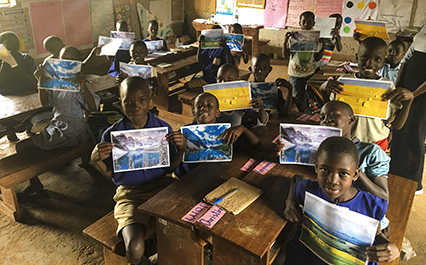
Students at Kiziba Mixed Primary School in Uganda show off letters they received from students in Lacombe.
Visit to Africa brings new knowledge and friendship
Matthew Oostvogels
The Masulita project made it apparent that no matter where we may live — northern Alberta, a big city or rural Uganda — a teacher is a teacher! We all want the same thing: a high quality education that provides the best outcomes for our students.
While in Masulita, I witnessed first-hand Alberta teachers providing professional development to a crowded room on a Saturday afternoon. The excitement in room showed how much the Ugandan teachers desired and appreciated this PD.
While teaching in two schools, I experienced a beautiful culture and learned from the teachers that surrounded me. When I had an opportunity to implement lessons with the children, my co-teacher also learned new techniques. The transfer of pedagogical knowledge and friendship, both to and from, will definitely help me as I continue in the field of education.
Living at the UWESCO (Uganda Women’s Effort to Save Children) Orphanage, I experienced the phenomenal impact that this organization has on children who are orphaned in the area. The large groups of children running to the front of our residence became commonplace throughout our stay, which would prompt us to take out simple supplies like pencil colours and sheets of paper, or balloons and soccer balls in exchange for the biggest smiles! As we entered the gate after teaching at one of the local schools, we’d be greeted by children running to hold our hand with those same smiles on their faces.
Although the project is over, I know in my heart I will return and encourage others to apply as this has truly been a life-changing experience that I will treasure. ❚
Matthew Oostvogels is a university studies instructor at Northern Lakes College in Peace River.
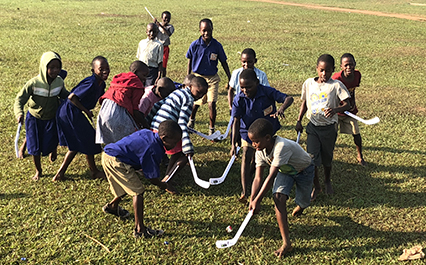
African students demonstrate their hockey skills with mini-sticks.
Change For Children — Guatemala
Importance of quality education highlighted by volunteer experience
Jessica Kornder, Steve Mazerolle, Angela Mendez, Colette Mondor and Michael Plouffe
What an amazing adventure! On July 6, 2018 a team of teachers from Alberta and colleagues from Change for Children met in Guatemala City. Our next stop was the Comitancillo region in the western highlands of Guatemala.
In the communities of San Isidro,
El Calvario and Chamaque we explored the following educational topics: technology to diversify learning; student investigation around culture, productivity and economical development; and communication and language.
Chamaque
In the rural village of Chamaque, we were asked to support teachers in developing a school project around the curricular outcome of investigating culture, development and productivity to address community needs. Our dedicated colleagues tasked their students with investigating problems and solutions while we supported strategies for integrating cross-curricular subject matter into project-based learning.
In the end, students learned the art of Mayan basket and mat weaving from a local artisan (one of the last in her community), using recycled and natural materials, and then presented and sold their products at a school event, to which the community was invited. The teachers were enthusiastic about the project and are already planning how to expand the opportunities for student learning and continue this as a yearly event.
Meeting such strong teachers and dedicated, welcoming students will leave a lasting impact on us. We gained awareness of ways to adapt curriculum to context and hope to integrate such valuable community projects into our own classrooms.
San Isidro
In the communities surrounding Comitancillo, students learn Spanish as a second language — their first language is Mayan Mam. Supporting bilingual education in San Isidro was challenging because students were very shy. Typically having few outside visitors to their community, they were reluctant to communicate with us.
We worked in the pre-primary (4–5 year olds), primary (5–6 year olds) and the Grade 1 class (6–7 year olds). Alongside local teachers, we worked on language learning strategies such as active participation, literacy centres and using manipulatives to help language learning. As teachers have few resources or materials, we tried to use and collect things found in their environment such as sticks and rocks for counting and making letters. The kids had a lot of fun collecting these materials, and the teachers were happy to have something concrete to work with. We also left with some strategies from the teachers in San Isidro that we are excited to try out in our classrooms.
El Calvario
The focus in El Calvario was to introduce staff and students to seven tablets and one RACHEL, a remote area community hotspot for education and learning. RACHEL is a small, portable, plug-and-play server that stores open educational resources and makes that content available offline through a wireless connection. With this technology we were able to provide a vast library of digital content (books, games, videos, textbooks and offline versions of websites) to a school that had no Internet access.
We were joined by Mundo Possible, a Guatemalan non-profit group that provides training for RACHEL. Following the one-day training, teachers had time to familiarize themselves with the technology and digital content. Together we looked at how they might integrate this new tool into their lessons through some more creative teaching approaches.
We were amazed at how quickly the teachers embraced the technology. We were able to support two of the teachers in introducing the technology to their students. After having spent a week in the El Calvario classrooms with limited resources,
distracting sounds and rote learning, we watched as students donned headphones and took control of their own learning.
Back In Alberta
After having time to take a step back and reflect on our collective journey to Comitancillo, up and into the hills of San Isidro, El Calvario and Chamaque, it is apparent that we have each returned with a deepened sense of solidarity with our colleagues at home and abroad. We’ve also returned
with a renewed sense of
importance in attaining the goal of providing quality education for all children around the globe. Although it was challenging at times, it was an amazing experience, and we would encourage those who are thinking of embarking on an experience like this to do so.
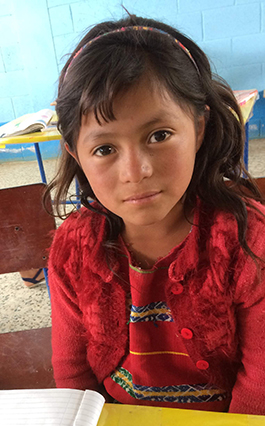 We recognize how fortunate we are to teach in a province where we have well-established teacher training institutions, a plethora of accessible learning resources and multiple
professional development
opportunities, all of which help us bring quality public
education to Alberta children. Volunteering with this project in Guatemala, in partnership with Change for Children and the ATA, allowed us to have a small part in working towards achieving the same goal in another corner of the world. However, there is still more work to do. ❚
We recognize how fortunate we are to teach in a province where we have well-established teacher training institutions, a plethora of accessible learning resources and multiple
professional development
opportunities, all of which help us bring quality public
education to Alberta children. Volunteering with this project in Guatemala, in partnership with Change for Children and the ATA, allowed us to have a small part in working towards achieving the same goal in another corner of the world. However, there is still more work to do. ❚
Alberta teachers who travelled to Guatemala returned
with a renewed sense of the importance of providing
quality education to all the world’s children.
